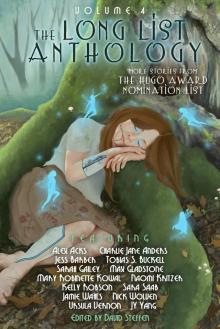- Home
- David Steffen
The Long List Anthology Volume 5 Page 2
The Long List Anthology Volume 5 Read online
Page 2
Your nickname is so tender on her tongue. But you’ve thought through all other avenues: you don’t want Lillian to take out loans and be saddled with so much debt like your friends’ children; you don’t want her to bear such a burden her entire life, not while you’re still paying off debts too. You can’t rely on Lillian’s father to provide for her, not after he left your family and took what little money you had. And although Lillian’s been doing her best to apply for scholarships, they’re not enough.
You shake your head.
The two of you sit in silence as you start the car and drive back to your mother’s place. The sun sets behind you, casting a brilliant glow over the Earth, washing the sky from orange to blue. As you crest over a hill, the sparkling lights of the city below glitter in the darkness, showing you a million lives, a million dreams.
When you get to your mother’s house, you only have one question to ask her.
“如果你需要做同样的决定,” you say, “你也会这样做吗?”
You don’t know what it would have been like if you were in Lillian’s shoes, if your mother had to make the same decision as you. But as your mother smiles at you, sadness tinging the light in her eyes, the curve of her lips, you know she understands.
“当然,” she says.
Of course.
• • • •
The waiting room is much starker than the consultation room you were in before: the seats are less comfortable, the temperature colder; you’re alone except for a single TV playing world news at a low volume.
You read the paperwork, doing your best to understand the details of the procedure—for all you pride yourself on your English, though, there are still many terms you don’t understand completely:
The Company’s (proprietary?) algorithms (iterate?) through near-infinite (permutations?) of sentences, extracting a neural map. The (cognitive?) load on the brain will cause the Applicant to experience a controlled stroke, and the Applicant’s memory of the Language will be erased. Common side effects include: temporary disorientation, nausea. Less common side effects include partial (aphasia?) of nontarget languages and (retrograde?) amnesia. Applicant agrees to hold Company harmless . . .
You flip over to the Chinese version of the contract, and, while some of the terms raise concern in you, you’ve already made your decision and can’t back out now. You scan the rest of the agreement and sign your name at the bottom.
The lab is clinical, streamlined, with a large, complicated-looking machine taking up most of the room. An image of the brain appears on a black panel before you.
“Before we begin,” the technician says, “do you have any questions?”
You nod as you toy with your hospital gown. “Will I be able to learn Mandarin again?”
“Potentially, though it won’t be as natural or easy as the first time around. Learning languages is usually harder than losing them.”
You swallow your nervousness. Do it for Lillian. “Why can’t you make a copy of the language instead of erasing it?”
The technician smiles ruefully. “As our current technology stands, the imaging process has the unfortunate side effect of suppressing neurons as it replicates them . . .”
You can’t help but wonder cynically if the reason why the neurons have to be suppressed is to create artificial scarcity, to inflate demand in the face of limited supply. But if that scarcity is what allows you to put Lillian through college, you’ll accept it.
The technician hooks electrodes all over your head; there’s a faint hum, setting your teeth on edge.
As the technician finishes placing the last of the electrodes on your head, certain parts of the brain on the panel light up, ebbing and flowing, a small chunk in the back active; you try to recall the areas of the brain from biology classes in university, and, while different parts of your brain start to light up, you still don’t remember the names of any of the regions.
The technician flips a couple switches, then types a few commands. The sensation that crawls over you is less of a shock than a tingling across your scalp. Thoughts flash through your mind too fast for you to catch them; you glance up at the monitor and see light firing between the areas the technician pointed out, paths carving through the brain and flowing back and forth. The lights flash faster and faster until they become a single blur, and as you watch, your world goes white.
The technician and nurse keep you at the institute for a few hours to monitor your side effects: slight disorientation, but that fades as the time goes by. They ask if you have anyone picking you up; you insist that you’re fine taking public transportation by yourself, and the technician and nurse relent. The accountant pays you the first installment of the money, and soon you’re taking the steps down from the institute’s main doors, a cool breeze whipping at your hair.
The bus ride home is . . . strange. As you go from west Los Angeles toward the San Gabriel Valley, the English-dominating billboards and signs starts to give way to Chinese. Although you can still understand the balance of the characters, know when they’re backwards in the rearview mirrors, you can’t actually read them—they’re no more than shapes: familiar ones, but indecipherable ones. You suck down a deep breath and will your heart to stop beating so quickly. It will take time to adjust to this, just as it took time to adjust to being thrown into a world of English when you first immigrated to the United States.
A corner of the check sticks out of your purse.
You’ll be okay.
• • • •
Your family is celebrating Chinese New Year this weekend. You drive with Lillian over to your mother’s senior living apartment; you squeeze in through the door while carrying a bag of fruit. Your mother is cooking in the tiny kitchenette, the space barely big enough for the both of you. She’s wearing the frilly blue apron with embroidered teddy bears on it, and you can’t help but smile as you inhale the scent of all the food frying and simmering on the stove.
“Bongmong?” you say in Cantonese. It’s one of the few words you can remember—as the days passed, you realized that some of your Cantonese had been taken too, its roots intertwined and excised with your Mandarin.
“(???). (???????),” your mother says, gesturing toward the couch. You and Lillian sit down. A period drama plays on the television. The subtitles go by too fast for you to match sound to symbol; Lillian idly taps away on her phone.
A few moments pass like this, your gaze focused on the television as you see if you can pick up something, anything at all; sometimes, you catch a phrase that jogs something in your memory, but before you can recall what the phrase means, the sound of it and its meaning are already gone.
“(???)!”
Lillian gets up, and you follow suit. The small dining room table has been decked out with all kinds of food: glistening, ruby-red shrimp with caramelized onions; braised fish; stir-fried lotus root with sausage; sautéed vegetables . . . you wish you could tell your mother how good it looks; instead, you can only flash her a smile and hope she understands.
“(?????????), (?????????),” your mother says.
Lillian digs in, picking up shrimp with her chopsticks; you scold her and remind her of her manners.
“But (??????) said I could go ahead,” Lillian says.
“Still,” you reply. You place some food on your mother’s plate first, then Lillian’s; finally, you set some food on your own plate. Only after your mother’s eaten do you take a bite.
Lillian converses with your mother; her Mandarin sounds a little stilted, starting and stopping, thick with an American accent, but her enthusiasm expresses itself in the vibrant conversation that flows around you. You stay quiet, shrinking into yourself as your mother laughs, as Lillian smiles.
You’re seated between Lillian and your mother; the gap across the table from you is a little too big, spacing the three of you unevenly around the table. As the syllables cascade around you, you swear the spaces between you and your mother, between you and Lillian, grow larger and larger.
“I bet she bought her Mandarin,” Lillian says. It’s an offhanded comment, but still you try to see if you can detect any disgust in her words.
“Is that so bad?” you ask.
“I don’t know; it just seems a little . . . (appropriative?), you know?”
You don’t know. Lillian doesn’t know. You were planning on telling her the instant you came home, but you didn’t know how to bring it up. And now . . . you want to keep your sacrifice a secret, because it’s not about you—it was never about you. But it’s only a matter of time before Lillian finds out.
You don’t know how she’ll react. Will she understand?
Lillian rests her head on your shoulder. You pull her close, your girl who’s grown up so fast. You try to find the words to tell her what you’d do for her, how important it is that she has a good future, how much you love her and want only the best for her.
But all you have is silence.
* * *
S. Qiouyi Lu writes, translates, and edits between two coasts of the Pacific. Their fiction and poetry have appeared in Asimov’s, F&SF, and Uncanny, and their translations have appeared in Clarkesworld. They edit the flash fiction and poetry magazine Arsenika. You can find out more about S. at their website, s.qiouyi.lu.
Field Biology of the Wee Fairies
By Naomi Kritzer
When Amelia turned fourteen, everyone assured her that she’d find her fairy soon. Almost all girls did. You’d find a fairy, a beautiful little fairy, and catch her. And she’d give you a gift to let her go, and that gift was always beauty or charm or perfect hair or something else that made boys notice you. The neighbor girl, Betty, had caught her fairy when she was just nine, and so she’d never even had to go through an awkward adolescent stage; she’d been perfect and beautiful all along.
Not all fairies were equal, of course. Some of them would do a much better job for you. The First Lady Jackie Kennedy, for example, had caught the fairy queen. Or so almost everyone said. “So keep your eyes open,” Amelia’s mother told her.
“I don’t want to catch a fairy,” Amelia said. “If I did catch a fairy, I’d keep her in a jar like my mice and study her.”
Everyone laughed when she said things like that, except for Betty, who rolled her eyes and said that Amelia would change her mind when she grew up a bit. “You don’t want to be an old maid like Miss Leonard,” she pointed out. Miss Leonard was their English teacher. No one had ever asked her about this directly, but everyone agreed that Miss Leonard had never caught a fairy.
Amelia had quite a few mice. She was working on a science project for the West District Science Day at the Central State College. In her project, which she’d been working on for over a year, she was teaching mice to run mazes, to see what factors affected learning. To eliminate the problem of genetic variation, she was training litters rather than individual mice. Each litter, she divided in half, once they were weaned, setting one as the control group and one as the experimental group, marking their tails with indelible ink to keep track. She’d train them for two months, making careful notes on her results. When she was done with an experimental group, she’d donate the mice to the local zoo to feed to their boa constrictor. The zookeeper was quite perplexed the first time she came over with a jar of mice, and even more perplexed when Amelia wanted to stay and watch the snake eat the mice. He clearly thought they were her pets. “Don’t girls like cute things?” he said.
Amelia was baffled by his attitude. Sure, the mice were cute, but they weren’t pets like the cat and the dog, they were experimental subjects. Also, if she kept all of them, she’d quickly be drowning in rodents. Her parents were willing to tolerate a certain amount of smell and mess, as long as Amelia kept it to her room, but they had their limits.
(“It will be fine,” her father had said to her mother. “Sooner or later, she will surely find her fairy and move on.” Move on to dresses and hairstyles and makeup and boys, was what he meant.)
Amelia’s father taught history at her high school, which made some things better and some things worse. Better: she got a ride to school every day. Worse: she got in trouble twice anytime she got in trouble at school.
One day in late November, she was in her Spanish class and the idiot boy sitting behind her thought it would be hilarious to repeatedly poke her with his ruler. Amelia told him to stop. He didn’t stop. So she took out her math book, because it was the heaviest book in her bag and also her least favorite, and threw it at his head, knocking him out of his seat. Getting sent to detention was worth it. But, of course, her Spanish teacher tattled on her to her father and he took away the book she was reading for a week and her parents made her wash all the windows. That was a lot more annoying.
“You’ll appreciate attention from boys once you meet your fairy,” her mother told her as she wrung out the cloth into the bucket.
“I don’t want to find a fairy,” Amelia said.
“You’ll change your mind eventually,” her mother said.
“How old were you when you caught your fairy?” Amelia asked, curious.
Her mother’s eyes got a little distant. “I was a good deal older than you, actually. I was nearly eighteen and I’d pretty much concluded there weren’t any fairies in our part of Virginia. My sister and I were out together, and we saw two, and you’d better believe we chased them. Luckily, they ran in different directions. Mine went left and Reva’s went right. If we’d wound up chasing the same one, I don’t know what we’d have done!”
Amelia’s mother would have let Reva catch it, Amelia was pretty sure. If it had come to that.
“It wasn’t too long after that I met your father.”
Amelia’s parents had met during the war. Her father was a Yankee from Maine, her mother a poor farmer’s daughter from Virginia. You could see the fairy’s gifts in the first pictures of them together: her mother’s beaming, glamorous smile, her perfect posture. Amelia actually had the perfect posture, even without a fairy: the “posture” unit in gym class was the only one she’d gotten an A in. But her teeth were crooked, and she couldn’t see a thing without her thick glasses. Also, makeup was time-consuming and fancy clothes were usually uncomfortable.
“I want to be a scientist,” Amelia said.
“You can be beautiful and a scientist,” her mother assured her. “You know, I went to business school a few months after I caught my fairy. You’re smart enough for college and I certainly hope you’ll go.”
“I’ve heard some kids say that Miss Leonard killed her fairy.”
“That’s nonsense,” her mother said. “Some girls never do meet fairies and that’s probably all that happened to your English teacher.”
• • • •
During Christmas vacation, Betty came over one afternoon. She admired Amelia’s mice and then wanted to do Amelia’s hair. “It’s so straight and long,” she said. “We could totally make you look like Audrey Hepburn.” For a minute, Betty almost had it in place, but then a pin slipped out of place and the hairstyle collapsed like a fallen cake.
“I can try to do yours,” Amelia offered, although Betty already looked like a girl out of a shampoo ad: a band held it in place as it rippled in shining waves. Probably thanks to the fairy. “What did your fairy give you, anyway?”
“Perfect hair,” Betty admitted. “I sometimes wish I’d asked for nicer skin. I figured that would be easier to fix with makeup. Some days it is, some days it isn’t.”
The sun was slanting low in the sky outside and Amelia started weighing out food for the mice. Betty watched with interest for a while, then asked, “Can you tell your mother I tried?”
“That you tried what?”
“That I tried to do your hair?”
“I guess? Wait, why?” Amelia put down the scoop and turned to look at Betty. “Did my mother put you up to this?”
“That’s a terrible way of putting it. She might have asked if I’d have a go at showing you some new styles, though.”
Amelia heaved a long sigh. “Well, I’ll tell her. You don’t have to stay any longer, if you don’t want.”
“I was sort of hoping you’d show me your mice running their maze, though,” Betty said.
“Really? Or did my mother put you up to that, too?” Amelia knew even as she asked that this was a ridiculous question. Her parents put up with her science project and they’d be happy enough when she won, but they certainly weren’t going to try to convince Betty to fake an interest. She pulled the maze out from under her bed and took out the log book, stop watch, and peanut butter.
“What’s the peanut butter for?” Betty asked.
“It’s the treat when they finish the maze. Mice like it a lot better than cheese.” She opened up a package of crackers and started spreading peanut butter on them.
“Can I help?” Betty asked.
“Sure,” Amelia said, and handed her the knife.
“They’re so cute,” Betty said when the mice came out.
“Do you want any when I’m done with them?” Amelia offered.
“Oh, no. My mother would probably die on the spot if I brought a jar of mice home.” They set up the maze and Amelia ran the mice through.
After Betty had gone home, Amelia finished her record-keeping and then brushed out her hair, which was still stiff from the hairspray Betty had used to try to keep it in place. She wondered if a fairy would make her hair stay in place properly, or if a fairy would make her want to keep her hair in place properly. If she hadn’t pulled the pin out when Betty wasn’t looking, she probably could have brought the style off.
• • • •
Amelia found her fairy on a freezing-cold January day, when she had to walk to school because her father had needed to go in very early for a meeting and she hadn’t gotten up in time to get a ride.

 The Long List Anthology Volume 2
The Long List Anthology Volume 2 The Long List Anthology Volume 6
The Long List Anthology Volume 6 The Long List Anthology Volume 4
The Long List Anthology Volume 4 The Long List Anthology Volume 5
The Long List Anthology Volume 5